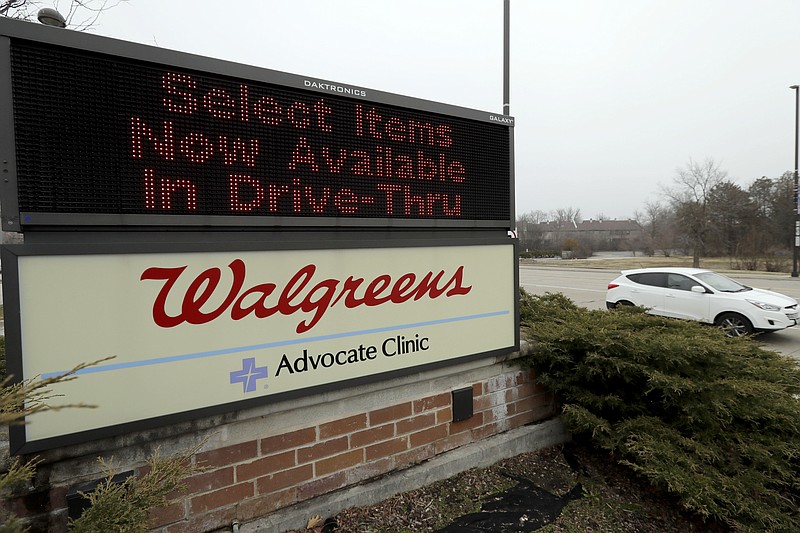WASHINGTON -- America's employers added 235,000 jobs in August, a surprisingly weak gain after two months of robust hiring and the clearest sign to date that the delta variant's spread has discouraged some people from flying, shopping and eating out.
The August job growth the government reported Friday fell far short of the gains of roughly 1 million in each of the previous two months. The hiring jumps in June and July had followed widespread vaccinations that allowed the economy to fully reopen from pandemic restrictions. Now, with Americans buying fewer plane tickets, reducing hotel stays and filling fewer entertainment venues, some employers in those areas have slowed their hiring.
Economists polled by Bloomberg have been looking for gain in August of 725,000 jobs.
Still, the number of job openings remains at record levels, with many businesses eager for workers, and hiring is likely to rebound in the coming months. Even last month's modest job growth was sufficient to lower the unemployment rate to 5.2% from 5.4% in July. With consumers willing to spend and companies trying to hire, the U.S. economy looks healthy.
Job growth in August was driven by 74,000 positions added in professional and business services, 40,000 in private education, and 37,000 in manufacturing.
[Video not showing up above? Click here to watch » arkansasonline.com/93ushiring/]
The details of Friday's jobs report showed how the delta variant held back overall job growth last month. The sectors of the economy where hiring was weakest -- restaurants, hotels and retailers -- were mainly those that require face-to-face contact with the public. More Americans said they were unable to work in August because their employer closed or lost business to the pandemic than said so in July.
"There's no question that the delta variant is why today's job report isn't stronger," President Joe Biden said. "I know people were looking, and I was hoping, for a higher number."
"I think the fingerprints of the delta variant were all over this report," said Scott Anderson, chief economist at Bank of the West in San Francisco. "We saw a big pullback in pandemic-impacted industries, and it was a pretty broad-based disappointment."
Hiring in the category that includes restaurants, bars and hotels sank to zero in August after those sectors had added roughly 400,000 jobs in both June and July. Restaurant dining, after having fully recovered in late June, has declined to about 9% below pre-pandemic levels, according to reservations website OpenTable.
As a consequence, many economists now predict that the Federal Reserve won't make a long-awaited announcement that it will begin dialing back its low-interest rate policies until November or later.
[Video not showing up above? Click here to watch » arkansasonline.com/93usjobs/]
U.S. payrolls are still 5.3 million below their pre-pandemic level.
WORKERS NEEDED
A lack of available workers remains a major hurdle to robust hiring. A few months ago, many economists had expected a fading pandemic to encourage more people to resume their job searches. Worries about getting sick on the job would fade, they hoped. And as schools reopened, more parents, particularly women, would return to the workforce.
So far, that hasn't happened. But the demand for workers remains strong. The job listings website Indeed says the number of available jobs grew in August. And the National Federation for Independent Business said its surveys show that half of small businesses have jobs they cannot fill.
Across the economy, that difficulty is compelling employers to offer higher pay. Average hourly wages rose 4.3% in August compared with a year earlier.
Walmart announced this week that it will hire 20,000 people to expand its supply chain and online shopping operations, including jobs for order fillers, drivers, and managers. Amazon said Wednesday that it is looking to fill 40,000 jobs in the U.S., mostly technology and hourly positions.
And Fidelity Investments said Tuesday that it is adding 9,000 more jobs, including in customer service and information technology. In such sectors, where face-to-face contact with the public isn't generally required, hiring remains strong.
[CORONAVIRUS: Click here for our complete coverage » arkansasonline.com/coronavirus]
$300-A-WEEK BENEFIT
Governors in about 25 states stopped paying the $300-a-week federal jobless benefit in June and July because, they said, the extra money was discouraging recipients from looking for work. Yet the proportion of Americans with jobs or searching for them was flat in August, Friday's report showed, suggesting that the cutoff has had little impact so far. Some academic research has found that the early cutoffs have led to only a small increase in hiring.
The $300 payment, as well as two federal programs that cover the self-employed and gig workers, and the long-term unemployed, are set to end next week. About 8.9 million people will lose all their unemployment aid as a result.
One of them is Marianne Leblanc. A live-events designer, Leblanc, 58, lives in Las Vegas, where she used to oversee huge corporate displays at conferences such as the Consumer Electronics Show. Once the pandemic hit, all that work dried up.
Leblanc recently accepted a nine-week temporary job that will require her to fly to several cities, many of them with high covid counts, which she is reluctant to do because she has lupus, which weakens the immune system.
She also is interviewing for a permanent job, but she has seen previous opportunities fall through. She fears losing the home she rents once her supplemental jobless aid ends.
"It's been an emotional roller coaster for the past year and a half," Leblanc said, "and it's just being amplified" by the impending loss of aid.
Information for this article was contributed by David McHugh of The Associated Press; by Nelson D. Schwartz of The New York Times; and by Eli Rosenberg and Heather Long of The Washington Post.
.
